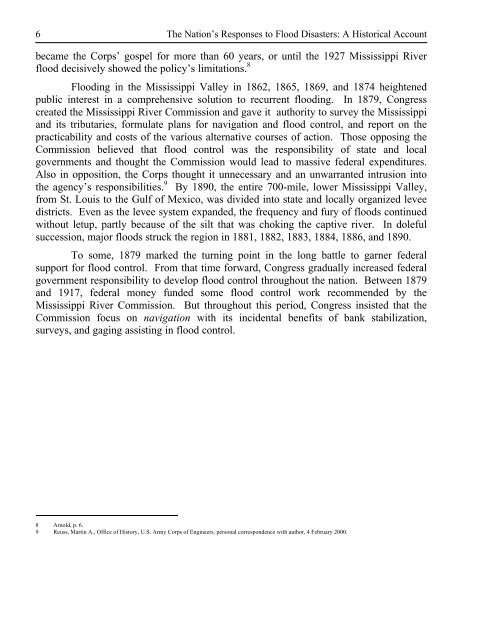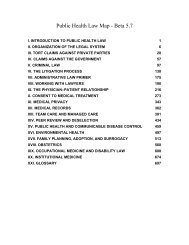The Nation's Responses To Flood Disasters: A Historical Account
The Nation's Responses To Flood Disasters: A Historical Account
The Nation's Responses To Flood Disasters: A Historical Account
Create successful ePaper yourself
Turn your PDF publications into a flip-book with our unique Google optimized e-Paper software.
6<br />
<strong>The</strong> Nation’s <strong>Responses</strong> to <strong>Flood</strong> <strong>Disasters</strong>: A <strong>Historical</strong> <strong>Account</strong><br />
became the Corps’ gospel for more than 60 years, or until the 1927 Mississippi River<br />
flood decisively showed the policy’s limitations. 8<br />
<strong>Flood</strong>ing in the Mississippi Valley in 1862, 1865, 1869, and 1874 heightened<br />
public interest in a comprehensive solution to recurrent flooding. In 1879, Congress<br />
created the Mississippi River Commission and gave it authority to survey the Mississippi<br />
and its tributaries, formulate plans for navigation and flood control, and report on the<br />
practicability and costs of the various alternative courses of action. Those opposing the<br />
Commission believed that flood control was the responsibility of state and local<br />
governments and thought the Commission would lead to massive federal expenditures.<br />
Also in opposition, the Corps thought it unnecessary and an unwarranted intrusion into<br />
the agency’s responsibilities. 9 By 1890, the entire 700-mile, lower Mississippi Valley,<br />
from St. Louis to the Gulf of Mexico, was divided into state and locally organized levee<br />
districts. Even as the levee system expanded, the frequency and fury of floods continued<br />
without letup, partly because of the silt that was choking the captive river. In doleful<br />
succession, major floods struck the region in 1881, 1882, 1883, 1884, 1886, and 1890.<br />
<strong>To</strong> some, 1879 marked the turning point in the long battle to garner federal<br />
support for flood control. From that time forward, Congress gradually increased federal<br />
government responsibility to develop flood control throughout the nation. Between 1879<br />
and 1917, federal money funded some flood control work recommended by the<br />
Mississippi River Commission. But throughout this period, Congress insisted that the<br />
Commission focus on navigation with its incidental benefits of bank stabilization,<br />
surveys, and gaging assisting in flood control.<br />
8 Arnold, p. 6.<br />
9 Reuss, Martin A., Office of History, U.S. Army Corps of Engineers, personal correspondence with author, 4 February 2000.
















